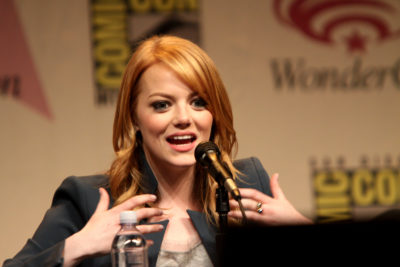
In 1973, women’s tennis champion Billie Jean King played against one-time superstar athlete Bobby Riggs in a match deemed the “Battle of the Sexes” to prove not just which gender produced better tennis players, but whether men were in fact superior beings, and if the “women’s liberation” movement had lasting momentum.
When the film “Battle of the Sexes,” a dramatization of this intensely publicized match, begins, the newly-crowned women’s tennis champion, Billie Jean works with her manager and a gaggling group of female tennis players to start a new professional league in protest for equal pay.
Despite Billie Jean’s vocal complaints, male champions at the time received around six times the amount of prize money female champions earned.
Billie Jean’s other problem — given her high-profile name and the era in which she lived is her sexual orientation. Though married to exceptionally handsome Larry (Austin Stowell), her attraction to her female hairdresser, Marilyn (Andrea Riseborough), causes rifts in Billie Jean’s personal and professional relationships.
This quiet, troubled love story is one of the movie’s strongest aspects, and the rough, 1970s image quality of the film casts a soft glow on both the intimacy of Billie Jean’s romance with Marilyn as well as her character itself. It offers more to her character than the noble, diplomatic and driven female tennis player — love makes Billie Jean a real person.
As Billie Jean, a bulked-up Emma Stone, fresh off her Best Actress Oscar for last year’s almost-Best-Picture, “La La Land” (2016) performs admirably. She opts for her own interpretation of a character rather than an imitation of a real-life person — though Billie Jean did serve as a special consultant on the film.
Natalie Morales as no-nonsense Rosie Casals rounds out the female tennis league, each player providing a small but well-done part to the main cast.
In addition to a smart-mouthed but not vulgar Sarah Silverman as Billie Jean’s manager, perfectly long-suffering with a perpetual cigarette in hand, “Battle of the Sexes” also boasts an unusual amount of comedic actors for a drama.
Steve Carell — reuniting with “Little Miss Sunshine” directors Jonathan Dayton and Valerie Faris — portrays Billie Jean’s competitor, Bobby Riggs, with Fred Armisen as his dietician, and Chris Parnell, Nelson Franklin and Dan Bakkedahl in cameo roles.
The magnificent but modest costumes and makeup also help make the world of ‘70s tennis come alive on screen.
Bobby’s estranged wife wears several flashy getups, but the tennis costumes — designed in the film by a scene-stealing as a queer-fairy-godmother-type character — offer a perfectly understated authenticity matched with the simplicity of Stone’s lack of makeup, signature Billie Jean haircut and wire-rimmed glasses.
“Battle of the Sexes” is best when it understates, while its weaknesses lie in over-sentimentality, mostly forced by a sometimes-intrusive score.
More effective is its grainy cinematography, which subtly echoes behind-the-scenes-style documentary footage, emphasized by shots through doorways and in mirrors, capturing the isolation, pressure and desperation of Billie Jean and her rival.
Unfortunately, for the most part, Bobby, with his gambling addiction, corny jokes and constant hustling, is more pathetic than sympathetic. He desperately sets up the high-profile match for money and to win back his wife, but also to find some dignity.
He might earn more pity points if he kept his mouth shut — partly because of Carell’s prosthetic teeth, but mostly because of his outrageous and provocative commentary on gender. A self-proclaimed “chauvinist pig,” he makes a mockery of the sport for fame, while true sexists (notably Jack Kramer, played by Bill Pullman) remain in control of the sport and its marketing.
While it is clear that the match is a joke to Riggs, it is also clear that winning is the only way Billie Jean can be taken seriously. Women’s tennis becomes a stand-in for women’s rights, and Billie Jean is easy to root for in the face of dated sexism. By the time the actual match is played, Billie Jean represents all of the disenfranchised fighting, and, literally and metaphorically, is “The Man.”
The film executes the match perfectly, adding suspense without overdoing it with music or longing stares — the rest of the film lets the viewer know how much is at stake without having to hit them over the head with it.
Even if one knows the outcome of the match from their own knowledge of sports history, the emotion behind the outcome is enough to make an audience cheer — indeed, the theater audience applauded along with the audience on screen whenever Billie Jean scored a point.
“Battle of the Sexes” is, at its core, a feel-good movie about victory in diversity.
Though set in the ‘70s, Billie Jean’s story should resonate with all who joined in the Women’s March earlier this year, or who believe in gender equality, as well as LGBTQ rights. Viewers deserve the triumph of this movie, and the inspiration of Billie Jean King.


